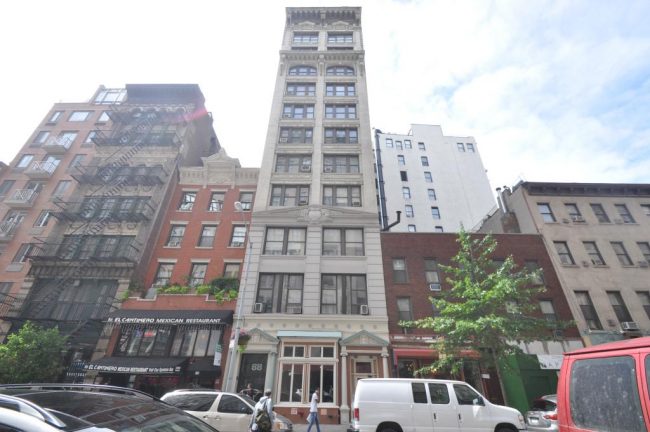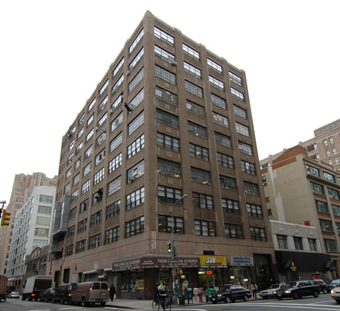When IBM inked a deal to lease every desk at WeWork’s 88 University Place co-working space last year, Adam Neumann had more than one reason to celebrate.
Neumann and top WeWork brass had been working hard to win over corporate clients, and IBM was the first reported case of a company agreeing to take over an entire location. But few knew that Neumann also had a more direct financial stake in the agreement: he personally owns part of the property, and the deal with the technology giant guaranteed a steady stream of dollars into his pockets.
Property records show that in July 2015, fashion designer Elie Tahari bought the 11-story building near Union Square for $70 million. Sources familiar with the deal said Neumann quietly partnered with Tahari on the acquisition, and owns a substantial stake in the building. Neumann, sources said, owns the stake privately, not through WeWork.
After Tahari and Neumann agreed to buy the building, WeWork signed a forward lease to occupy eight floors, which it now manages on behalf of IBM.

88 University Place
The office building is just one of several private investments Neumann has made since co-founding the co-working company in 2010. He has acquired stakes in office buildings, startups, a development site and several luxury properties. Sources describe him as a passionate investor who likes to seize opportunities wherever he sees them. And from his perch at the top of a company last valued at $20 billion, he sees many.
“He’s a hustler before he’s anything else,” said one source close to the company, speaking on condition of anonymity.
But 88 University also shows how these personal investments can create complications. Neumann owns a stake in both the tenant and the landlord — a potential conflict of interest.
“I would be furious,” said one unconnected venture investor who spoke on condition of anonymity, citing Neumann’s clout in the startup world.
WeWork declined to comment on 88 University. Asked how the company deals with potential conflicts of interest, a spokesperson said: “WeWork has a review process in place for related party transactions and those transactions are disclosed to investors.” A source close to WeWork claimed Neumann was not involved in negotiating the lease, and claims the lease’s terms are in line with WeWork’s leases at other buildings.
Going in blind

Woolworth Building (Credit: Williams New York)
WeWork was barely two years old when Neumann made his first big real estate investment. In early 2012, Neumann and an early investor in WeWork, Waterbridge Capital’s Joel Schreiber, toured the Woolworth Building in Lower Manhattan, eyeing it as a possible co-working location.
WeWork never signed a lease for the property. But Neumann saw the tower’s potential for a condominium conversion and approached its owners, Steve Witkoff and Ruby Schron, with an offer to buy the upper 25 floors. They said yes, and Neumann signed a contract to buy the floors for $68 million.
“I don’t know what possessed him to think he could do it, but he did it,” Ken Horn, founder of Alchemy Properties, said in 2013. “He’s the kind of guy who sets his mind on something and moves forward on it.”
There were just two problems: Neumann didn’t have any money, and he didn’t have any development experience. Mark Lapidus, who later became WeWork’s head of real estate, remembered meeting Neumann at a wedding around that time.
“So, he says, ‘I just went hard on a building, you’ve probably heard about it, the Woolworth Building in New York […] Can you help me?,’” Lapidus recalled in an interview with Commercial Observer. “I say, ‘What do you mean?’ and he says, ‘Well, I have no equity, I have no debt and I’m trying to negotiate these condo docs. I have no idea what I’m doing, I have no development partner and I’m kind of working on this business called WeWork that I have four locations for, and I’m really focused on, but I think this whole Woolworth Building could be amazing.’”
Four months later, Neumann brought on Horn as a majority investor and co-developer. In September 2017, a penthouse at the condo conversion hit the market for $110 million, but sales at the building are said to be sluggish, and some observers are skeptical whether the project can turn a profit.
Crawl, walk, run
Not long after the Woolworth deal, Neumann made his first major office investment.

175 Varick Street
In November 2012, Extell Development sold its leasehold on the 170,000-square-foot office building 175 Varick Street in Hudson Square for $32.75 million. The buyer was a partnership between investment firm AEW Capital Management, which was the equity behind the deal, and an entity called WeWork 175 Promoter LLC, which served as the ownership’s manager. The entity was tied to a group of WeWork executives including Neumann, Lapidus and CFO Ariel Tiger, property records show. According to a source familiar with the deal, the executives negotiated a so-called promote interest: WeWork was already the anchor tenant (it had signed a lease a year earlier), and if AEW ended up selling it for a profit, the LLC would get a share of the spoils. And that’s how it played out. In August 2014, AEW sold the leasehold to Tishman Speyer for $58.7 million, a nearly 80 percent premium over the purchase price. AEW’s Marc Davidson, who worked on the deal, did not respond to a request for comment.
One possible explanation for why Neumann made personal real estate investments during WeWork’s early years is that the co-working company didn’t initially see itself as a landlord. The idea was to pursue an “asset light” strategy popular among VC investors, sources said. Buying buildings may be profitable in the long run, but it ties up a lot of money that could be otherwise spent on opening new locations, hiring staff, investing in new technology or acquiring competitors.
That strategy gradually changed. In early 2017 WeWork and private equity firm Rhone Group began raising money for a joint real estate investment fund, which later shelled out $850 million to buy the Lord & Taylor flagship building on Fifth Avenue.
Neumann also looks to be involved in a Chelsea development project. In November, an entity called Chelsea Realty Capital LLC took over a $65 million mortgage on a development assemblage at 123–131 West 23rd Street and 116–120 West 24th Street. The LLC was registered to WeWork’s headquarters and Adam Neumann signed the loan document. A source close to WeWork told TRD at the time that the project was Neumann’s personal investment.
Jeffrey Dagowitz had put together the development site over several years, and a source told TRD in early 2017 that it was rumored to be the future site of a WeLive co-living tower. Dagowitz did not respond to a request for comment.
I don’t know what possessed him to think he could do it, but he did it.He’s the kind of guy who sets his mind on something and moves forward on it.
When making acquisitions, Neumann tends to bypass brokers and goes straight to owners, according to one agent who learned this firsthand.
Last year, a broker shopping around a Manhattan office property received a call from the owner.
“There’s a guy here with long hair who wants to buy the building and says he owns WeWork,” the owner said, according to the broker, who spoke on condition that their name and the address of the building not be mentioned. When the owner told Neumann to speak to the broker, WeWork’s CEO responded that he “crushes brokers’ balls.”
Neumann met the broker and made a verbal offer that was about 30 percent below the highest bid. He didn’t get the building. The broker said Neumann never explicitly said whether he planned to buy the property himself, or through WeWork.
WeMansion

Linden Farms
As investors pumped more and more money into WeWork and Neumann’s net worth rose, he started buying luxury properties for himself. In 2012, he bought a home in the Hamptons for $1.715 million. In 2014, he paid $10.5 million for a six-bedroom townhouse in Greenwich Village. And last year he bought four apartments in a single building on Irving Place in Gramercy for $35 million. He also owns a 60-acre estate in Pound Ridge, Westchester, which he bought in 2016 for $15 million. The farm will reportedly host classes for WeWork’s new grade school for entrepreneurial kids, WeGrow.
Commercial real estate aside, Neumann has also invested in startups. He owns stakes in the Panama-based hostel company Selina, audio streaming company Tunity and map tool company Pins.
And according to the New York Post, WeWork’s “founders” invested in retail tech company Outernets. Reached by email, Outernets’ Omer Golan would not confirm whether Neumann is an investor.
Forbes currently estimates Neumann’s net worth at $2.5 billion, and he reportedly sold some of his stake in WeWork for $100 million.
It’s not unusual for startup CEOs to make personal investments. Amazon’s Jeff Bezos invested $250,000 in Google in 1998, for example, a stake that would be worth billions today if he had kept it.
“It’s a thing that has been common in Silicon Valley for years and has migrated to New York,” said Zach Aarons, a co-founder of the real estate tech accelerator Metaprop NYC. The key, he said, is disclosing all investments and having a third party vet them to prevent potential conflicts. “There’s nothing necessarily bad about it,” he said. “It’s just you need to make sure your organization has these kinds of processes and protocols in place.”
